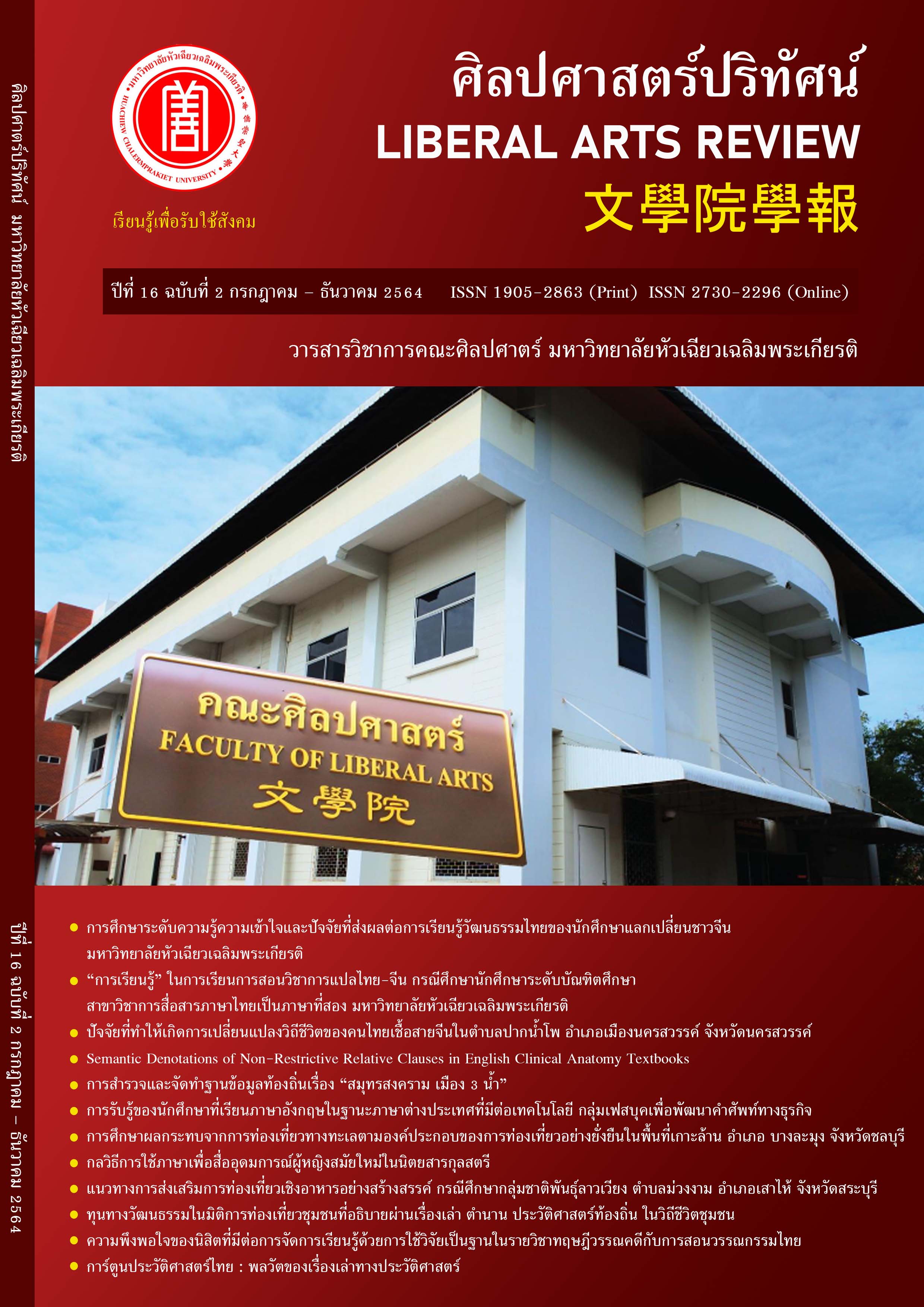A Study of Cognition and Factors Affecting Learning Thai Culture of Chinese Exchange Students in Huachiew Chalermprakiet University
Keywords:
Thai culture, Learning, Exchange studentsAbstract
This research aims to: 1) study the level of Thai culture knowledge for Chinese exchange students, 2) study factors affecting Thai culture learning of Chinese exchange students, and 3) study guidelines for development of teaching management of Thai Culture for Chinese exchange students using a mixed method. The sample consisted of 45 Chinese exchange students and 5 teachers in Thai language and culture class. The research tools used were test, questionnaire, and an interview. The statistics used were the mean, standard deviation, frequency value, percentage and the dependent t-test.
The results of this study revealed that: 1) The knowledge’s level about Thai culture of Chinese exchange students were in average of 73.73 percent, good level, had a statistically higher scores than before learning with 0.01 level of significance. 2) Supporting factors affecting Thai culture learning of Chinese exchange students can be rank from the highest to the lowest level as follows: teacher factor, teaching management factor, learner factor, and environmental factor. 3) The guidelines for the development of teaching management of Thai culture for Chinese exchange students show that learners should develop Thai communication skills. In addition, teachers should develop second and third language communication skills, revise content to match the skill level of the learners, and create an atmosphere conducive to learning Thai Culture and use surrounding environment as a base for learning Thai culture.
References
ชนิดา ยอดสาลี, และ กาญจนา บุญส่ง. (2559). ปัจจัยที่ส่งผต่อผลสัมฤทธิ์ทางการเรียนของนักเรียนในสังกัดสำนักงานเขตพื้นที่การศึกษาประถมศึกษาประจวบคีรีขันธ์ เขต 2. วารสารมหาวิทยาลัยศิลปากร, 9(1), 1208-1223.
ธนวัฒน์ อรุณสุขสว่าง. (2558). ปัจจัยที่ส่งผลต่อความสามารถในการใช้ภาษาอังกฤษตามทักษะการเรียนรู้ในศตวรรษที่ 21 ของนักเรียนมัธยมศึกษาปีที่ 6 เขตพื้นที่การศึกษามัธยมศึกษากรุงเทพมหานครเขต 2 เพื่อรองรับการเข้าสู่ประชาคมอาเซียน. วารสาร Veridian E.Journalมหาวิทยาลัยศิลปากร, 8(2), 493-505.
ธิติญา แสงมณี. (2546). สภาพปัญหาและแนวทางการจัดการเรียนการสอนวิชาภาษาไทยสำหรับนักเรียนชาวต่างชาติ โรงเรียนนานาชาติเชียงใหม่. (วิทยานิพนธ์ปริญญามหาบัณฑิต). มหาวิทยาลัยเชียงใหม่, เชียงใหม่.
ปัทมา ดีลิ่น, ปริยาภรณ์ ชูแก้ว, และ ศรีอังคาร ถาวโรฤทธิ์. (2560). เทคนิคการจัดการเรียนรู้เพื่อแก้ปัญหาการเรียนการสอนวิชาวัฒนธรรมจีน ในระดับอุดมศึกษา. วารสารอินทนิลทักษิณสาร(ฉบับพิเศษ), 12(3), 101-125.
ปรียาพร วงศ์อนุตรโรจน์. (2543). การบริหารงานวิชาการ. กรุงเทพมหานคร: ศูนย์สื่อเสริมกรุงเทพ.
โพยมรัตน์ นพรัตน์. (2558). วัฒนธรรมกับความหมาย. วารสารมนุษยศาสตร์ปริทัศน์, 7(1), 15.
มหาวิทยาลัยหัวเฉียวเฉลิมพระเกียรติ. (2560). หลักสูตรศิลปศาสตรบัณฑิต สาขาวิชาการสื่อสารภาษาไทยเป็นภาษาที่สอง ฉบับปรับปรุง พ.ศ.2560. สมุทรปราการ: มหาวิทยาลัยหัวเฉียวเฉลิมพระเกียรติ.
วลัยรัตน์ จันทร์เสมา. (2554). ความสามารถในการสื่อสารแบบวัจนภาษาของเด็กปฐมวัย โดยใช้กิจกรรมการเรียนการสอนแบบจิตปัญญา. (วิทยานิพนธ์ปริญญามหาบัณฑิต). มหาวิทยาลัยศรีนครินทรวิโรฒ, กรุงเทพมหานคร.
วิไล ธรรมวาจา. (2561). การศึกษาปัญหาการกล่าวสุนทรพจน์ภาษาไทยของนักศึกษาจีน มหาวิทยาลัยหัวเฉียวเฉลิมพระเกียรติ. วารสารศิลปศาสตร์ปริทัศน์, 13(26), 28-38.
วิไลภรณ์ ฤทธิคุปต์. (2561). การจัดการเรียนรู้โดยใช้ชุมชนเป็นฐาน : กลยุทธ์การจัดการเรียนรู้ที่มีประสิทธิภาพของครูในศตวรรษที่ 21. วารสารบัณฑิตศึกษา มหาวิทยาลัยราชภัฏเชียงราย, 11(3), 179-191.
Fan Chunxia. (2560). การเรียนรู้วัฒนธรรมไทยจากหลักสูตรศิลปศาสตรบัณฑิต สาขาวิชาการสื่อสารภาษาไทยเป็นภาษาที่สอง ของนักศึกษาแลกเปลี่ยนชาวจีนในมหาวิทยาลัยหัวเฉียวเฉลิมพระเกียรติ. (วิทยานิพนธ์ปริญญามหาบัณฑิต). มหาวิทยาลัยหัวเฉียวเฉลิมพระเกียรติ, สมุทรปราการ.
Downloads
Published
How to Cite
Issue
Section
License
บทความที่ได้รับการตีพิมพ์เป็นลิขสิทธิ์ของวารสารศิลปศาสตร์วิชาการและวิจัย
ข้อความที่ปรากฏในบทความแต่ละเรื่องในวารสารวิชาการเล่มนี้เป็นความคิดเห็นส่วนตัวของผู้เขียนแต่ละท่านไม่เกี่ยวข้องกับมหาวิทยาลัยหัวเฉียวเฉลิมพระเกียรติ และคณาจารย์ท่านอื่นๆ ในมหาวิทยาลัยฯ แต่อย่างใด ความรับผิดชอบองค์ประกอบทั้งหมดของบทความแต่ละเรื่องเป็นของผู้เขียนแต่ละท่าน หากมีความผิดพลาดใดๆ ผู้เขียนแต่ละท่านจะรับผิดชอบบทความของตนเองแต่ผู้เดียว




